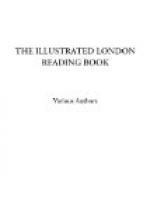The case is the same with orators, philosophers, critics, or any author who speaks in his own person without introducing other speakers or actors. If his language be not elegant, his observations uncommon, his sense strong and masculine, he will in vain boast his nature and simplicity. He may be correct, but he never will be agreeable. ’Tis the unhappiness of such authors that they are never blamed nor censured. The good fortune of a book and that of a man are not the same. The secret deceiving path of life, which Horace talks of—fallentis semita vitae—may be the happiest, lot of the one, but is the greatest misfortune that the other can possibly fall into.
On the other hand, productions which are merely surprising, without being natural, can never give any lasting entertainment to the mind. To draw chimaeras is not, properly speaking, to copy or imitate. The justness of the representation is lost, and the mind is displeased to find a picture which bears no resemblance to any original. Nor are such excessive refinements more agreeable in the epistolary or philosophic style, than in the epic or tragic. Too much ornament is a fault in every kind of production. Uncommon expressions, strong flashes of wit, pointed similes, and epigrammatic turns, especially when laid too thick, are a disfigurement rather than any embellishment of discourse. As the eye, in surveying a Gothic building, is distracted by the multiplicity of ornaments, and loses the whole by its minute attention to the parts; so the mind, in perusing a work overstocked with wit, is fatigued and disgusted with the constant endeavour to shine and surprise. This is the case where a writer over-abounds in wit, even though that wit should be just and agreeable. But it commonly happens to such writers, that they seek for their favourite ornaments even where the subject affords them not; and by that means have twenty insipid conceits for one thought that is really beautiful.
There is no subject in critical learning more copious than this of the just mixture of simplicity and refinement in writing; and, therefore, not to wander in too large a field, I shall confine myself to a few general observations on that head.
First, I observe, “That though excesses of both kinds are to be avoided, and though a proper medium ought to be studied in all productions; yet this medium lies not in a point, but admits of a very considerable latitude.” Consider the wide distance, in this respect, between Mr. Pope and Lucretius. These seem to lie in the two greatest extremes of refinement and simplicity which a poet can indulge himself in, without being guilty of any blameable excess. All this interval may be filled with poets, who may differ from each other, but may be equally admirable, each in his peculiar style and manner. Corneille and Congreve, who carry their wit and refinement somewhat farther than Mr. Pope (if poets of so different a kind can be compared together), and Sophocles and Terence, who are more simple than Lucretius, seem to have gone out of that medium wherein the most perfect productions are to be found, and are guilty of some excess in these opposite characters. Of all the great poets, Virgil and Racine, in my opinion, lie nearest the centre, and are the farthest removed from both the extremities.




